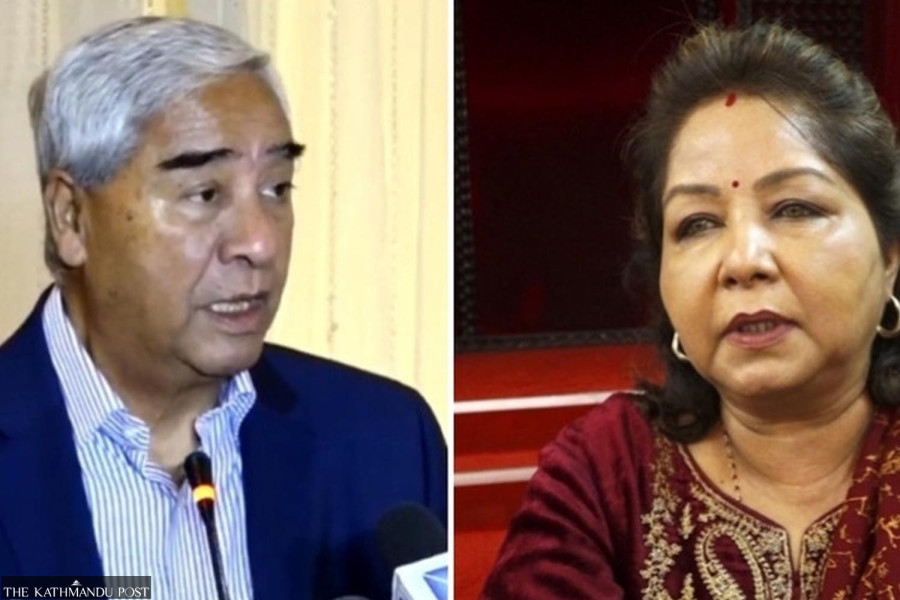National
How the Deubas got passports on a public holiday
Special services are provided to top former and current state officials, even on holidays.
Anil Giri
Social media is abuzz with speculations on how former prime minister Sher Bahadur Deuba and his spouse, Arzu Rana Deuba, the immediate past foreign minister, got diplomatic passports on September 19, when offices were closed as Nepal marked its Constitution Day.
The Ministry of Foreign Affairs and the Department of Passports are still tight-lipped on how and when the Deuba couple obtained diplomatic passports. The Deubas were severely beaten by an angry mob on September 9 at their residence in Budhanilkantha, Kathmandu.
There are also charges that they were trying to flee the country in the wake of the Gen Z protest.
Not only that, the Department of Money Laundering Investigation inspected Deuba’s residence last week and collected evidence of various currency notes set ablaze in an arson on September 9.
The injured Deubas were later rescued by a Nepali Army chopper and admitted to the Army Hospital, Chaunni. Both are undergoing treatment and their health is on the mend, a Nepali Congress leader said.
There were rumours that Deubas had obtained diplomatic passports and were fleeing to Thailand on the pretext of treatment. The Post spoke to several officials at the foreign ministry and the Department of Passports to find out how the Deubas had obtained the travel documents.
First, as Sher Bahadur is a former prime minister and his wife the immediate past foreign minister, they are both eligible for diplomatic passports, according to officials from the ministry and the department.
“We sometimes visit the residences of senior officials like the President, the prime minister and other high-ranking officials with mobile kits, which can perform personalised services like taking photos and other biometrics,” an official at the department said.
Another official at the foreign ministry claimed that the Deubas had applied for passports much before the Gen Z protests started on September 8.
“As passport services fall under essential services, we do provide limited services on public holidays. So a team was dispatched to take the photos and biometrics of the Deubas on September 19,” the official at the department said.
“The decision was made on humanitarian grounds as the couple was receiving care at the hospital. Their passports were printed on September 19.”
According to Article 6 of the Passport Act, the department issues a diplomatic passport to officials travelling abroad in the course of government business or special work… upon a decision of (or recommendation by) the minister, constitutional body or secretariat concerned.
The Passport Regulations 2020 details who is eligible for diplomatic passports.
Another controversy surrounded the supposed visas the Deubas had obtained for Thailand, which, many suspected, could be used to flee the country.
Nepal and Thailand signed an agreement on exemption of visa requirements for holders of diplomatic and official passports in January 1999. People of the two countries bearing these passports are exempt from visas for the period not exceeding 90 days in each other’s country, according to the Ministry of Foreign Affairs. With this provision, the Deubas do not need visas to fly to Thailand as they are holders of diplomatic passports, an official at the foreign ministry said.
“Yes, they have obtained the passports. But as this concerns personal details of Nepali citizens, we don’t want to say much more,” said Tirtha Raj Aryal, director general at the Department of Passports. “We do not disclose such information even to family members of the citizens concerned.”
Second, the department of passports has not received any communication from the highest authority on whether to issue the passports of particular persons or not. “With no such information received, we issued the passports,” he added.
In rare cases, if someone is sick or bedridden, officials at the passport office do visit hospitals and homes.
“We only evaluate papers about whether any individual is eligible for passports. Many criminals also get passports but we will not know. If an investigative agency writes to us not to issue a passport, we do not issue it, otherwise it is the right of every citizen. In Deubas’ case, no agency has written to us that they are criminals and they are ineligible for passports,” said Aryal.
The passport may be printed on a public holiday as the department offers limited services on such days, again because passport service falls under essential services, added Aryal.
For details like when the Deubas applied for the passports, what happened to their passports, when the passports were issued and who visited them, “I need to check our data bank”, said Aryal.




 8.79°C Kathmandu
8.79°C Kathmandu















